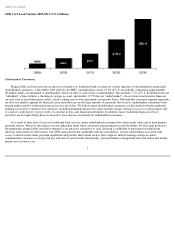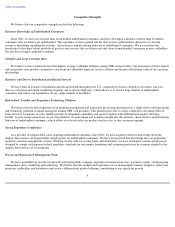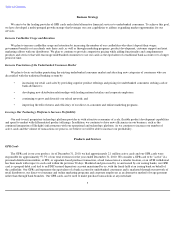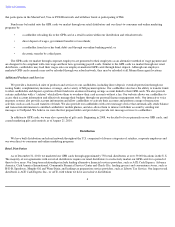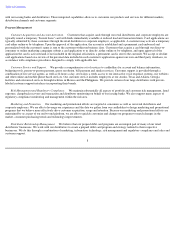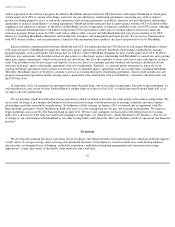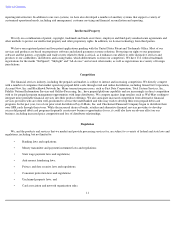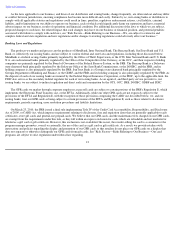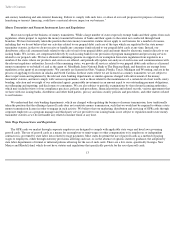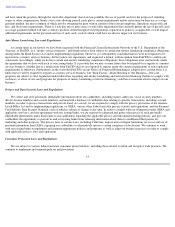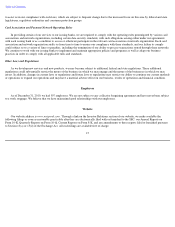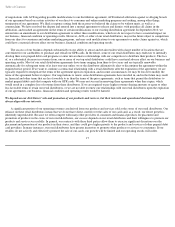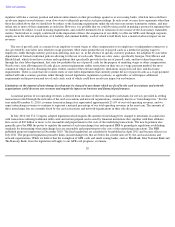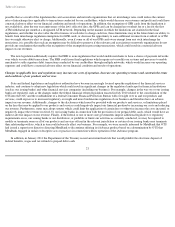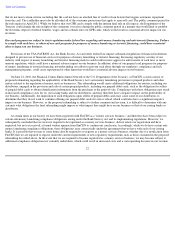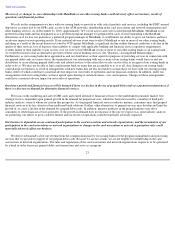NetSpend 2010 Annual Report Download - page 17
Download and view the complete annual report
Please find page 17 of the 2010 NetSpend annual report below. You can navigate through the pages in the report by either clicking on the pages listed below, or by using the keyword search tool below to find specific information within the annual report.
Table of Contents
anti-money laundering and anti-terrorist financing. Failure to comply with such laws, or abuse of our card programs for purposes of money
laundering or terrorist financing, could have a material adverse impact on our business."
Money Transmitter and Payment Instrument Laws and Regulations
Most states regulate the business of money transmitters. While a large number of states expressly exempt banks and their agents from such
regulation, others purport to regulate the money transmittal business of banks and their agents to the extent not conducted through bank
branches. We have historically taken the position that state money transmitter statutes do not apply to our business for a number of reasons,
including that we do not believe that our activities related to our prepaid debit cards are of the type which are regulated by the state money
transmitter statutes, in that we do not receive or handle any consumer funds related to our prepaid debit cards at any time. Instead, our
distributors collect all consumer funds related to the sale or load of our prepaid debit cards and remit them by electronic transfer directly to our
issuing banks. We, in turn, are compensated directly by each issuing bank for our provision of program management and processing services
related to our prepaid cards. We have obtained confirming opinions in support of our exemption from state regulation from regulators in a
number of the states where our products and services are offered, and periodically update our analysis of such issues and communications with
the relevant regulatory authorities. In each of the remaining states, we provide all services related to our prepaid debit cards either as a licensed
money transmitter or on behalf of, and as the agent of, MetaBank, Inter National Bank or The Bancorp Bank, and therefore are exempt from
regulation as the agent of an exempt entity. We currently are licensed in Ohio, Virginia, Florida, Texas, Michigan and Wyoming, and are in the
process of applying for licenses in Alaska and North Carolina. In those states where we are licensed as a money transmitter, we are subject to
direct supervision and regulation by the relevant state banking departments or similar agencies charged with enforcement of the money
transmitter statutes, and must comply with various requirements, such as those related to the maintenance of a certain level of net worth, surety
bonding, selection and oversight of our authorized agents, permissible investments in an amount equal to our outstanding payment obligations,
recordkeeping and reporting, and disclosures to consumers. We are also subject to periodic examinations by the relevant licensing authorities,
which may include reviews of our compliance practices, policies and procedures, financial position and related records, various agreements that
we have with our issuing banks, distributors and other third parties, privacy and data security policies and procedures, and other matters related
to our business.
We understand that state banking departments, which are charged with regulating the business of money transmission, have traditionally
taken the position that the offering of payroll cards does not constitute money transmission, such that we would not be required to obtain a state
money transmission license in order to engage in such activity. We believe that our marketing, distribution and servicing of GPR cards through
corporate employers as a program manager and third-party service provider to our issuing banks is not subject to regulation under state money
transmitter statutes as we do not handle any related consumer funds at any time.
State Wage Payment Laws and Regulations
The GPR cards we market through corporate employers are designed to comply with applicable state wage and hour laws governing
payroll cards. The use of payroll cards as a means for an employer to remit wages or other compensation to its employees or independent
contractors is governed by state labor laws related to wage payments. Most states do permit the use of payroll cards as a method of paying
wages to employees, either through statutory provisions allowing such use, or, in the absence of specific statutory guidance, the adoption by
state labor departments of formal or informal policies allowing for the use of such cards. There are a few states, specifically Georgia, New
Mexico and Rhode Island, which do not have statutes and regulations that specifically provide for the use of payroll cards,
13


